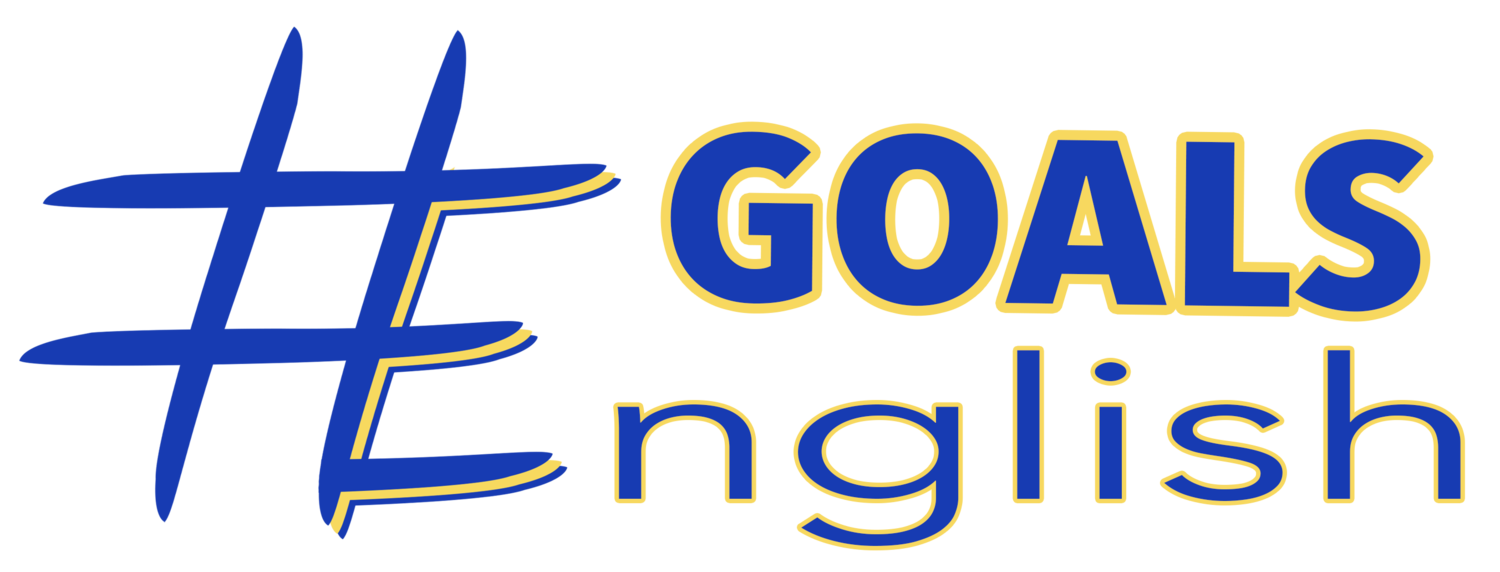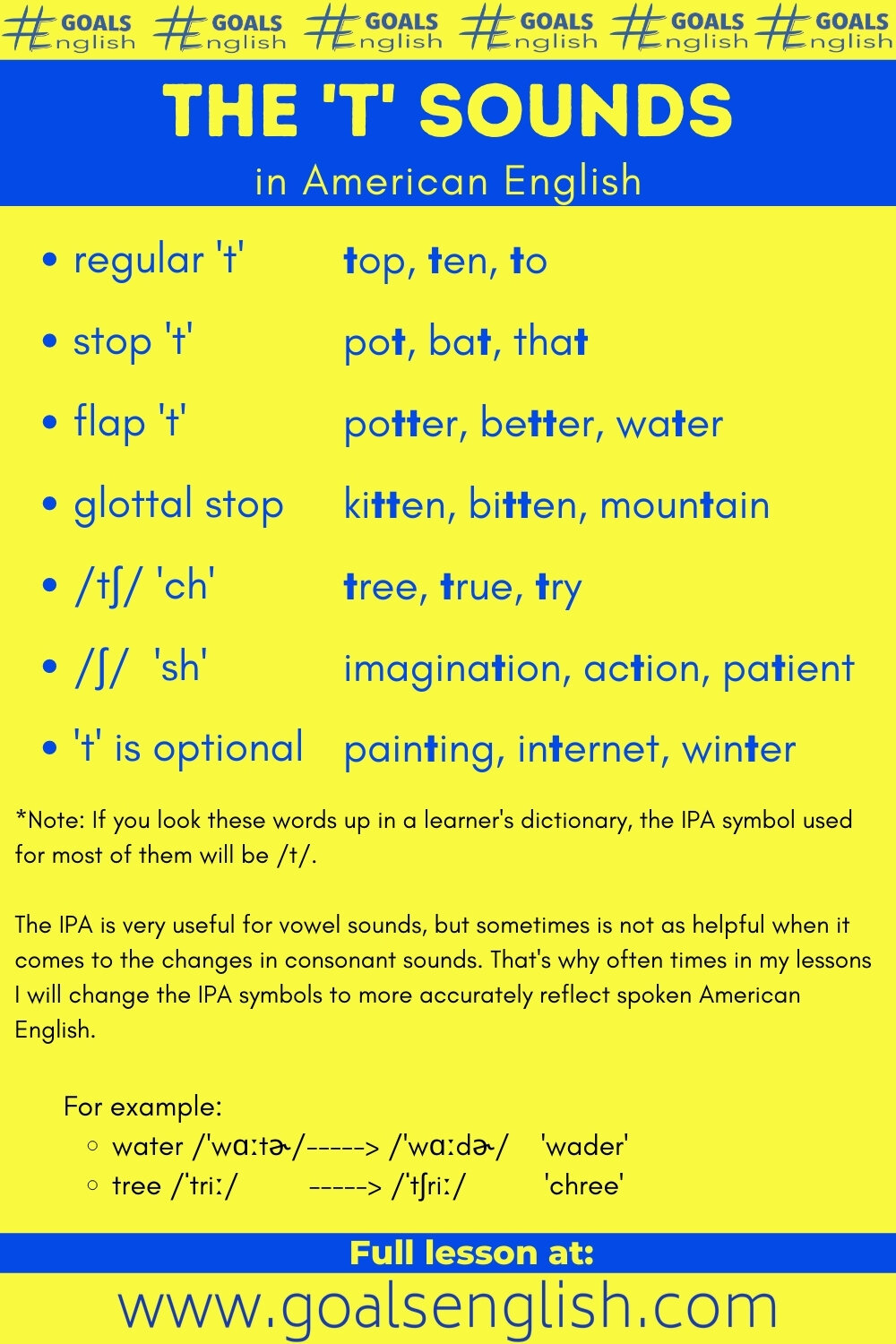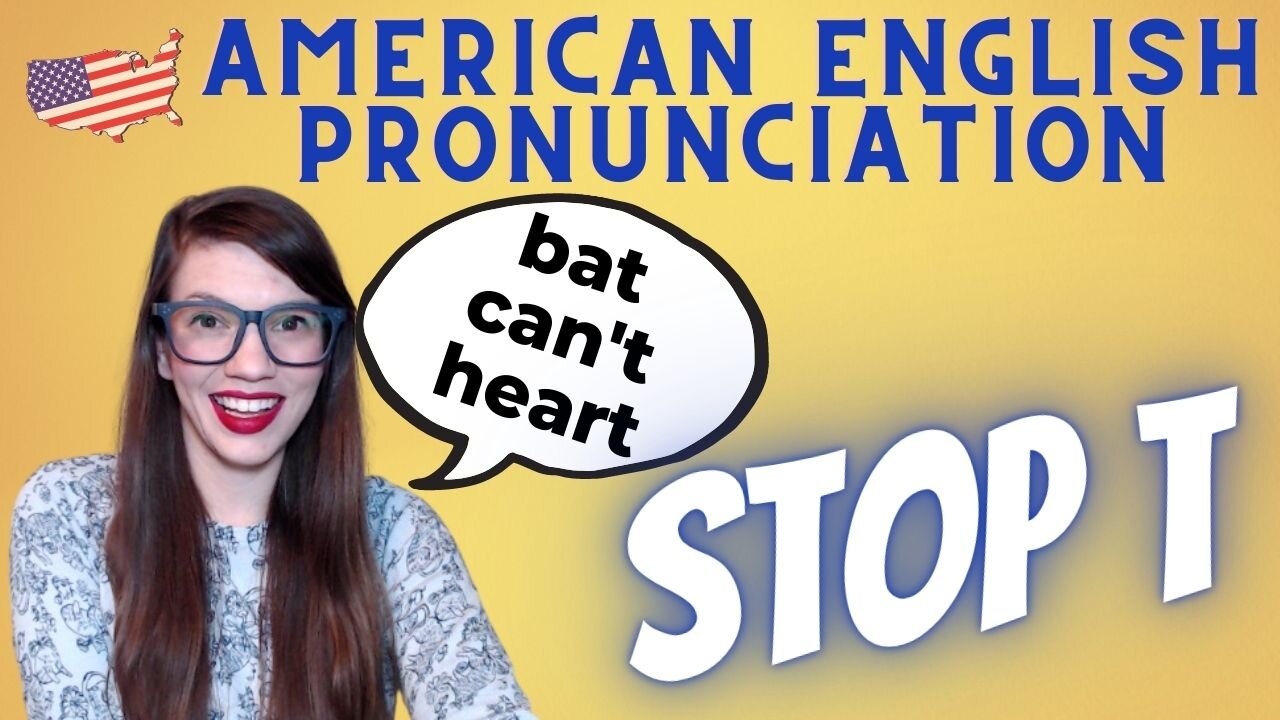WHAT IS A ‘FLAP T’?: Explanation, Word Lists, and Practice Sentences for American English Pronunciation
The ‘t’ Sounds Used In American English
The ‘t’ in its many forms is a sound that causes a lot of confusion for non-native speakers, especially if you have learned British pronunciation first. The ‘t’ as written in many words and phrases isn’t always pronounced the way you would think. There is a regular ‘t’, a stop ‘t’, a flap ‘t’, sometimes we don’t pronounce the ‘t’, sometimes the ‘t’ is pronounced as ‘ch’ or even ‘sh’, and other times we use what is called a glottal stop. The pronunciation of the ‘t’ sound and if and when it is pronounced often varies from British RP to general American pronunciation, and indeed across all different types of accents in English.
To make things even more complicated, there is really only one IPA (phonetic) symbol for the ‘t’ which is /t/ and it is written in most dictionaries, even in words where the ‘t’ is pronounced differently or not at all.
In this free English lesson, I will give an overview of the various pronunciations of the letter ‘t’ in American English, and then focus on one of the most difficult, yet frequently used sounds in American English pronunciation, the ‘flap t.’
Beneath the video, you will also find brief explanations and example word lists for the various sounds.
The Regular ‘t’ Sound in American English
What students generally thing of a ‘t’ sound usually happens when it is the first letter of a word or syllable.
For example:
ten
today
tonight
Tuesday
‘T’ is one of the voiceless sounds in English. What this means is that the sound is created with the control of the air in your mouth, without using your vocal cords. ‘T’ is also an aspirated sound, which means that you release a puff of air. If you make the ‘t’ sound just as young children are taught in phonics classes, you will feel that air hit you lips. The IPA symbol for this is /t/.
The ‘Stop t’ Sound in American English
Many words ending with a ‘t’ after a vowel will use what is sometimes called the 'stop t.’ This sound comes at the end of a word or sometimes even a syllable and is made the same way you would make a regular ‘t’ sound, only you stop your tongue and don’t let out that final puff of air. This means the ‘t’ sound in these cases are no longer aspirated. As I said, there is not a symbol commonly used to show this change in pronunciation, so the IPA symbol is still /t/.
For example:
pot
that
bat
cat
What is the ‘Flap t’ Sound?
Here’s a little note about general American pronunciation I often give my English students:
The American English accent has naturally evolved towards saying sounds in the most simple (and often lazy) way.
The ‘flap t’ is what I often call a ‘soft d’ in my lessons. A fully pronounced, fully aspirated ‘t’ sound takes more effort to pronounce in the middle of a word or phrase than a ‘soft d.’
Let me show you what I mean:
Say water /ˈwɑːtɚ/ with the t fully aspirated.
Now replace the ‘t’ with a ‘d’ sounds as in “wah-der” /ˈwɑːdɚ/
I have a lesson all about how to pronounce water if you’d like more explanation on this word specifically.
If done correctly, the second way is much easier to produce. It takes less effort with the tongue, lips, and mouth. This is the ‘flap t.’ Again, the IPA does not distinguish this sound and writes it as /t/, however for my lessons I prefer to write it as a /d/.
*Note for Spanish and Portuguese speakers: To English speakers, this sound is most comparable to the ‘d’ sound, but for you, however, it will sound more like what you think of as an ‘r’ such as in the word “para” in Portuguese and Spanish. For English speakers, and speakers of many other languages, this does NOT sound like the type of ‘r’ sound we use, such as in the word “run.”
What is the rule for when to use the ‘flap t’?
In general, here are some of the rules for when to use the ‘flap t’:
If a ‘t’ is between two vowels, whether in a word or between two words, it will be pronounced as a ‘soft d.’
‘Flap t’ will often occur between a vowel and a ‘dark l’ such as in “little” or “bottle.”
‘Flap t’ will also happen before or after an r-controlled vowel such as in “turtle” or “daughter.”
‘Flap t’ will happen after a ‘c’ /k/ or ‘s’ /s/ sound as in “doctor” or “sister.”
*Remember, this is English, so of course, there will be exceptions to these rules.
Here is one of my favorite tongue twisters for practicing the ‘flap t’ sound:
“Betty Botter Bought Some Butter”
Example Word List for the ‘flap t’ sound in American English
In the following list, remember, dictionaries, such as learnersdictionary.com (which I recommend for their use of IPA with American English sound bites), will not show the ‘d’ in the IPA, but the ‘t'. I change it in my lessons for simplicity. The following list of ‘flap t’ words is not meant to be all of the words that use this sound, but is just meant to give you an idea and when and where you will hear the ‘flap t’ sound, so you can listen for these words in the future. Once you start to hear and recognize the sound more, it will be easier to use it yourself and incorporate this pronunciation change into your normal, everyday speech.
Short ‘a’ /æ/ words with ‘flap t’:
batter —> ‘ba-der’ /ˈbætɚ/
I need to make the batter for the bread I’m baking.
matter —> ‘ma-der’ /ˈbætɚ/
It doesn’t matter if you come to the party or not. I’m ok either way.
Short ‘e’ /ɛ/ words with ‘flap t’:
letter —> ‘leh-der’ /ˈlɛdɚ/
I got a letter in the mail.
better —> ‘beh-der’ /ˈbɛdɚ/
Are you feeling better?
metal —> ‘meh-dl’ /ˈmɛdl̟/
Gold and silver are types of metal.
Short ‘i’ /ɪ/ words with ‘flap t’:
city —> ‘sih-dee’ /ˈsɪdi/
Have you been to New York City?
pretty —> ‘prih-dee’ /ˈprɪdi/
This flower is so pretty.
*Note: That’s right, pretty, is actually pronounced with a short ‘i’ sound!
sitter —> ‘sih-der’ /ˈsɪdɚ/
We need to get a baby sitter for next Saturday.
little —> ‘lih-dl’ /ˈlɪdl̟/
The kitten is so little.
Short ‘o’ /ɑː/ words with the ‘flap t’:
hotter —> ‘hah-der’ /ˈhɑːdɚ/
It’s hotter in Miami than in Chicago.
rotting —> ‘rah-ding’ /ˈrɑːdɪŋ/
The banana was rotting in the sun for three days.
potter —> ‘pah-der’ /ˈpɑːdɚ/
My niece loves reading Harry Potter.
Short ‘u’ /ʌ/ words with the ‘flap t’:
butter —> ‘buh-der’ /ˈbʌdɚ/
I love putting butter on my bread.
shutter —> ‘shu-der’ /ˈʃʌdɚ/
I live in the white house with the red shutters.
Long ‘a’ /eɪ/ words with the ‘flap t’:
waiter —> ‘way-der’ /ˈweɪdɚ/
The waiter brought over some water.
later —> ‘lay-der’ /ˈleɪdɚ/
See you later!
tasted —> ‘tays-ded’ /ˈteɪsdɛd/
Dinner tasted great.
Long ‘e’ /iː/ words with the ‘flap t’:
meter —> ‘mee-der’ /ˈmiːdɚ/
I put $2 in the parking meter.
theater —> ‘thee-(uh)-der’ /ˈθijətɚ/
I’ll see you at the movie theater.
Long ‘i’ /aɪ/ words with the ‘flap t’:
lighter —> ‘lie-der’ /ˈlaɪdɚ/
I need a lighter for these candles.
biter —> ‘bie-der’ /’baɪdɚ/
Careful, that dog is a biter.
Long ‘o’ /oʊ/ words with the ‘flap t’:
boater —> ‘boe-der’ /ˈboʊdɚ/
My uncle is an avid boater.
floating —> ‘floe-ding’ /ˈfloʊdɪŋ/
The raft is floating down the river.
Long ‘u’ /juː/ words with the ‘flap t’:
commuting —> ‘cu-myoo-ding’ /kəˈmjuːdɪŋ/
She’s commuting to work every Monday.
muted —> ‘myoo-did’ /ˈmjuːtəd/
You can’t hear the TV because it’s muted.
Long ‘oo’ /uː/ as in “moon” (long u without the ‘y’ sound) words with the ‘flap t’:
booted —> ‘boo-did’ /ˈbuːdəd/
I booted up the computer
Short ‘oo’ /ʊ/ (as in “book”) words with the ‘flap t’:
putting —> ‘puh-ding’ /ˈpʊdɪŋ/
I was putting the dishes away when I heard a knock at the door.
‘ou/ow’ /aʊ/ (as in “cow”) words with the ‘flap t’:
pouting —> ‘pow-ding’ /ˈpaʊɪŋ/
The kids were pouting because we ran out of cake.
‘oi/oy’ /oɪ/ (as in “boy”) words with the ‘flap t’:
hoisted —> ‘hoys-did’ /ˈhoɪsdəd/
The sailors hoisted up the sails.
Schwa /ə/ (as in “the”) words with the ‘flap t’:
sensitive —> ‘sen-suh-div’ /ˈsɛnsədɪv/
I’m a sensitive person.
I hope this lesson on the pronunciation of the flap ‘t’ and other ‘t’ sounds in American English was helpful for you.
Let me know if you have any questions!









